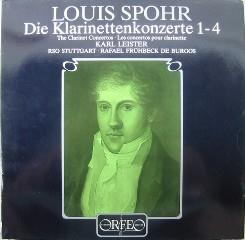Louis Spohr - Clarinet Concertos 1-4 (1984)
Louis Spohr - Clarinet Concertos 1-4 (1984)
Louis Spohr - Die Klarinettenkonzerte 1-4 (1984)

Konzert Nr. 1 C-Moll Op. 26 A1 Adagio - Allegro 11:07 A2 Adagio 3:26 A3 Rondo. Vivace 6:03 Konzert Nr. 2 Es-Dur Op. 57 B1 Allegro 11:41 B2 Adagio 5:03 B3 Rondo. Vivace 7:52 Konzert Nr. 3 F-Moll WoO 19 C1 Allegro Moderato 11:11 C2 Adagio 9:08 C3 Vivace Non Troppo 7:49 Konzert Nr. 4 E-Moll WoO 20 D1 Allegro Vivace 11:05 D2 Larghetto 7:37 D3 Rondo Al Espagnol 8:08 Karl Leister - clarinet Radio-Sinfonieorchester Stuttgart Rafael Frühbeck De Burgos - conductor
In the 1830s, Spohr was commonly considered undisputedly the greatest living composer. He was inspired to write his four clarinet concertos, which have always ranked among Spohr's most popular works, by his acquaintance with the Thuringian clarinettist Johann Simon Hermstedt. Up to today, the decidedly virtuoso clarinet concertos have been a challenge for any clarinet soloist, as they mirror Spohr's view of the form of the solo concerto as a projection surface to flaunt technical skill in an ideal symbiosis with the poetic and lyrical contents of the music. On this release, the works are performed by Karl Leister.Karl Leister began his solo career as a clarinetist with the Berlin Philharmonic Orchestra under Herbert von Karajan in 1959. At the same time his international career as a soloist and chamber musician began. He is one of the founders of the ensembles Blaser der Berliner Philharmoniker, Berliner Solisten as well as the Ensemble Wien-Berlin. Since the foundation of the Herbert von Karajan Academy of the Berlin Philharmonic Orchestra, Karl Leister has been teaching the young generation. ---hbdirect.com
During his lifetime Spohr was acclaimed as a great composer, and he embraced every genre with enthusiasm, composing ten operas, ten symphonies and the other genres in proportion. Since then his star has fallen badly and you will be lucky to find any of his works programmed. I have to say that most of the little I have heard has been rather bland: obviously very competent but rather lacking in character, like second-rate Mendelssohn.
These clarinet concertos, however, are different: they are all delightful pieces, full or charm and wit. As with Mozart, whom Spohr greatly admired, he was inspired by a particular player, in this case Johann Simon Hermstedt. Spohr met him playing the Mozart clarinet quintet, in which Spohr himself played first violin. He started working on the first concerto and invited Hermstedt to suggest any modifications. The concerto was actually unplayable on the clarinet as it then was, but, instead of making alterations, Hermstedt commissioned a new instrument with more keys on which he could play it as it stood. Spohr went on to write three further concertos for Hermstedt, as well as some other pieces.
These concertos all follow a similar pattern, with three movements, the first in sonata form, then a lyrical slow movement and an energetic rondo. Obviously Spohr knew Mozart’s concerto, the finest work ever written for the instrument, and occasionally this shows, but he departs from Mozart in his first movements, which do not use the double exposition typical of the classical concerto but the looser form also used by Weber in his clarinet concertos. Nor does he provide places for cadenzas, as he disapproved of them. However, the writing for the solo instrument is very virtuosic, with leaps, trills and runs as well as the sudden switches between registers which are very much in the character of the clarinet. The second concerto exploits extremes of register, ascending at one point to the very high C. The third is, if anything, even more virtuosic. The fourth is perhaps the finest of the four, because of the quality of its ideas. It is, incidentally, the only one to be written for clarinet in A. The fact that the third and fourth concertos do not have opus numbers is because Hermstedt held on to the manuscripts so Spohr could not publish them. It is, in fact, only quite recently that the scores have been published. Note that the concertos are not laid out in chronological order.
Karl Leister, the soloist here, was for many years principal clarinet with the Berlin Philharmonic under Karajan, and he made numerous recordings. He has a lovely liquid tone and expressive phrasing, as well as all the virtuosity you could wish for. Frühbeck de Burgos and the Radio-Sinfonie Orchester Stuttgart accompany well, and, despite these being very early digital recordings, I have no complaints about the sound. The booklet is very brief but it does not matter. The discs are slightly short measure but the layout is obviously sensible.
There are other recordings of these concertos, notably Michael Collins on two Hyperion discs now at a reduced price. I have not heard those, but a point in Leister’s favour is that he plays a German-style clarinet, slightly more soulful and less perky than the French-style instruments used elsewhere. These works have raised my opinion of Spohr, and readers can invest with confidence. ---Stephen Barber, musicweb-international.com
download (mp3 @320 kbs):
yandex mediafire ulozto solidfiles global.files workupload








